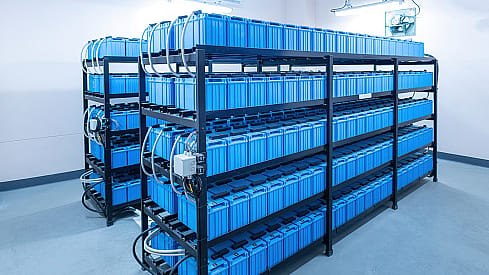GoodEnough Energy to build ₹450-cr 'gigafactory' in J&K
ADVERTISEMENT

GoodEnough Energy, a manufacturer of battery energy storage systems, will invest ₹450 crore to build a 20 gigawatt-hour gigafactory in Jammu & Kashmir by 2026.
Starting with an initial capacity of 7GWh, the company says this will be India's largest Battery Energy Storage Systems (BESS) gigafactory for grid stability.
The 'gigafactory' will have 20 GWH capacity by 2026. It will produce advanced battery energy storage systems, empowering various industries to reduce carbon emissions, it says.
GoodEnough Energy has committed a total investment of over ₹450 crore for the gigafactory in Jammu & Kashmir. The company says it aims to support India’s net-zero goal and various industries with high CO2 emissions including automation, mining, hospitals, refineries, malls and shopping complexes, etc. with its 7GWH of annual storage leading to the reduction of over 5 million tonne of CO2 emission in a year.
The company says it will also create job opportunities for over 100 SMEs as vendors and suppliers and will boost job generation in the J&K region.
The proposed investment comes at a time when the electricity industry is undergoing significant change, with a growing need for clean, reliable, and affordable power.
“This transformation demands innovative technical solutions and grid optimization strategies that can unlock new revenue streams and optimize energy usage. With India’s largest and state-of-the-art BESS Gigafactory in J&K, we are focusing on developing indigenous BESS technologies with global competence and cutting-edge features,” the company says.
With its capacity expansion, the company aims to reduce 15 million tonnes of CO2 emissions by 2026 through the gigafactory. “Each litre of diesel produces an average of 3 kg of CO2, considering two hours of daily backup operation of a 125KVA generator consuming 60 litres leading to an alarming 180 Kg of CO2 emission. One electricity unit (kwh) from a Diesel generator or coal plant produces one kilogram of CO2. GoodEnough Energy’s Gigafactory with an initial capacity of 7GWH annual storage aims to reduce over 5 Million tonnes of CO2 in a year, with 2 cycles every day. This is equivalent to the Indian Railway's annual carbon reduction target of 4 Million tones,” It says
To give strength to the country’s EV charging infrastructure, the company says it is also addressing the escalating power demand for EV fast charging stations, particularly in areas with weak grid infrastructure. “With the rapid adoption of electric vehicles, the need for fast charging facilities is growing vastly. Company’s BESS technologies enables fast charging in such locations, meeting the increasing demand effectively. Incorporating smart functionalities such as time shifting and peak shaving, users can store energy during off-peak hours to reduce costs and minimize demand charges,” it says.